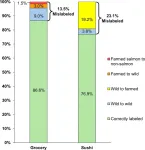(Press-News.org) Christopher D. Anderson, MD, MSc, chief of the Division of Stroke and Cerebrovascular Diseases at Brigham and Women’s Hospital and associate neurologist in the Department of Neurology and Center for Genomic Medicine at Massachusetts General Hospital, is the corresponding author and Jonathan Rosand, MD, MSc, co-founder of the McCance Center for Brain Health and neurologist in the Department of Neurology and Center for Genomic Medicine at Massachusetts General Hospital, is an author of a paper published on November 6, 2024, in Neurology®, the medical journal of the American Academy of Neurology, “Health-related behaviors and risk of common age-related brain diseases across severities of genetic risk.”
How would you summarize your study for a lay audience?
In this study, we explored whether healthy lifestyle choices, measured by a Brain Care Score (BCS), can lower the risk of stroke, late-life depression (LLD) and dementia, in individuals who are genetically predisposed to these conditions. Developed by Mass General Brigham researchers, the BCS is a brain health tool that measures healthy lifestyle choices in the form of a score that then reflects combined risk for the most common causes of age-related brain health conditions.
From the data we analyzed, we found in individuals with a higher BCS, which reflects healthier habits, had a significant decrease in their risk of stroke, LLD and dementia even when they had a higher genetic predisposition to these conditions. This protective lifestyle effect was strong enough to offset the increased risk from genetics. Our findings suggest that individuals who adopt healthy lifestyle choices can protect their brain health, regardless of their genetic risk.
How does your new study differ from your previous publications?
In previous research, we found a higher BCS is associated with a decreased risk of stroke, LLD and dementia. In this study, we discovered that this association extends to individuals who are genetically predisposed to these brain conditions.
How did you conduct your study?
In this study, we examined whether an individual’s BCS affects their genetic risk of stroke, LLD and dementia. After analyzing data from over 368,000 individuals in the UK Biobank, we discovered that a higher BCS significantly reduced the risk of stroke, late-life depression and dementia in individuals who had inherited an increased genetic risk for those conditions. Strikingly, we found that even a small 5-point increase in the BCS, through steps such as quitting smoking or controlling blood pressure, is strongly linked to a lower risk of brain diseases.
What are the implications?
Our work emphasizes how powerful healthy lifestyle choices can be, even for those of us who, because of our genes, are at higher risk of deterioration in our brain health as we age. For all of us, including those with higher genetic risk, the BCS offers a simple and direct guide to what we can do to protect our brains as we age. Patients can feel empowered to continue to modify behaviors to improve their health outcomes, regardless of their genetic risk.
What are the next steps?
We are working to update the BCS to make it even more user-friendly, allowing people to identify areas where they can improve their brain care without requiring detailed information about their medical histories. We are also studying how best to engage communities around the world with brain care tools that can enable them to take good care of their brains, prevent dementia, stroke, and depression, and thereby help themselves and their loved ones to flourish.
Authorship: In addition to Anderson and Rosand, Mass General Brigham authors include Sandro Marini, Tamara N. Kimball, Ernst Mayerhofer, Reinier W.P. Tack, Jasper R. Senff, Savvina Prapiadou, Jonathan Duskin, Christina Kourkoulis, Nirupama Techoor, Rudolph E. Tanzi, Sanjula D. Singh and Livia Parodi.
Disclosures: Ernst Mayerhofer is an employee of Regeneron Pharmaceuticals as of July 2023.
Paper cited: Marini S, et al. “Health-related behaviors and risk of common age-related brain diseases across severities of genetic risk” Neurology. DOI: WNL-2024-102529R1
END
Research Spotlight: Higher brain care score found to improve brain health regardless of genetic risk
2024-11-06
ELSE PRESS RELEASES FROM THIS DATE:
Variation in the measurement of sexual orientations is associated with sexual orientation-related mental health disparities
2024-11-06
Sexual orientation—dictated by factors like sexual identity, attraction and behavior—is challenging to measure comprehensively. This is reflected in variations in the number of lesbian, gay, bisexual and transgender people recorded across surveys using different measurement approaches. Most approaches focus on ‘sexual identity’ to understand mental health disparities, but differences in perceived notions of ‘identity’ and ‘attraction/behavior’ are prevalent. For instance, some ...
Study shows how high blood sugar increases risk of thrombosis
2024-11-06
A study conducted at the Center for Research on Redox Processes in Biomedicine (Redoxoma) helps understand how high blood sugar (hyperglycemia), one of the manifestations of diabetes, can cause thrombosis. The findings, reported in an article published in the Journal of Thrombosis and Haemostasis, can contribute to the development of strategies to prevent cardiovascular dysfunction in diabetics.
“The leading causes of death in Brazil and several other Latin American countries ...
Cachexia decoded: Why diagnosis matters in cancer survival
2024-11-06
Maintaining good health and well-being is crucial for how well patients respond to cancer treatments. Unfortunately, cachexia, or involuntary weight loss, is a major concern for many individuals with advanced cancer. A new study from Japan has revealed that lower cachexia rates, particularly with prevalence less than 40–50%, are linked to shorter overall survival (OS) rates. The study also showed that the diagnostic criteria used for cachexia detection can affect the reported cachexia prevalence.
People with advanced heart disease or cancer often face serious health challenges. Cachexia, an involuntary loss ...
Transportation institute awarded nearly $1 million in trucking education grants
2024-11-06
Safety is not only for truck drivers, but also the drivers around them.
The Virginia Tech Transportation Institute recently received nearly $1 million in two grants from the U.S. Department of Transportation’s Federal Motor Carrier Safety Administration to develop and enhance tractor-trailer educational programs.
“These two grants will allow us to continue transforming our research into practice,” said Rich Hanowski, director of the institute's division of freight, transit, and heavy vehicle safety. “The outreach initiatives will directly leave an impact on drivers ...
Sewage surveillance proves powerful in combating antimicrobial resistance
2024-11-06
Waterborne diseases affect over 7 million people in the U.S. every year, according to the Centers for Disease Control and Prevention, and cost our health care system over $3 billion. But they don’t impact all people equally.
A campuswide collaboration is using sewage surveillance as a vital strategy in the fight against diseases that spread through the water such as legionella and shigella. The ones that are most difficult to combat are diseases with antimicrobial resistance, which means they are able to survive against antibiotics that are intended to kill them.
A recent paper in Nature Water offers an encouraging insight: Monitoring ...
Natural environment is declining: are companies doing their part to save it?
2024-11-06
The natural environment across the globe is deteriorating, leading to crises like climate change, biodiversity loss, and water scarcity. Companies and industries play a major role in this decline, and they are expected to take responsibility for their environmental impact. A recent study by Probal Dutta from the University of Vaasa, Finland, suggests that companies can meet these expectations by openly sharing reliable, credible information about their activities, environmental performance, and effects on nature.
Probal Dutta’s doctoral dissertation at the University ...
New study sheds light on the role of sound and music in gendered toy marketing
2024-11-06
A groundbreaking study from Queen Mary University of London reveals that the music and soundscapes used in toy commercials are reinforcing rigid gender norms, shaping the way children perceive masculinity and femininity. The research uncovers how gender stereotypes are not only conveyed through visuals and language but are also deeply embedded in the sound and music used in advertisements targeted at children.
For more than 40 years, research has shown how gender polarisation in children’s ...
Pathogens which cling to microplastics may survive wastewater treatment
2024-11-06
Wastewater treatment fails to kill several human pathogens when they hide out on microplastics in the water, reports a new study led by Ingun Lund Witsø of the Norwegian University of Life Sciences, published November 6, 2024 in the open-access journal PLOS ONE.
Wastewater treatment plants are designed to remove contaminants from wastewater, but microplastics persist and can become colonized by a sticky microbial biofilm. Previous research has suggested that these microbial communities, called plastispheres, include potential pathogens, and thus might pose a risk to human health and the environment when treated wastewater and sludge are released.
In the new study, researchers ...
Effects of preterm birth extend into adulthood, study finds
2024-11-06
By analyzing all live births in Canada over a six-year period and following children for more than two decades, researchers found that preterm births and the related cognitive, development and physical health impacts of prematurity are associated with lower income, employment and university enrollment
Individuals born before 37 weeks of gestation, considered to be preterm infants, have, on average, lower employment income, university enrollment and educational attainment through age 28, according to ...
Salmon frequently mislabeled in Seattle grocery stores and sushi restaurants
2024-11-06
In a study of salmon samples from Seattle, Washington, grocery stores and sushi restaurants, DNA analysis revealed that 18 percent were mislabeled. Tracie Delgado and colleagues at Seattle Pacific University, WA, U.S., present these findings in the open-access journal PLOS ONE on November 6, 2024.
Washington State is one of the top suppliers of wild salmon eaten in the United States. The price of salmon depends on the species and whether it is farmed or wild caught. Prior studies have revealed frequent mislabeling of salmon in Washington markets and restaurants. In 2013, the state made it illegal to mislabel salmon, citing negative ...







